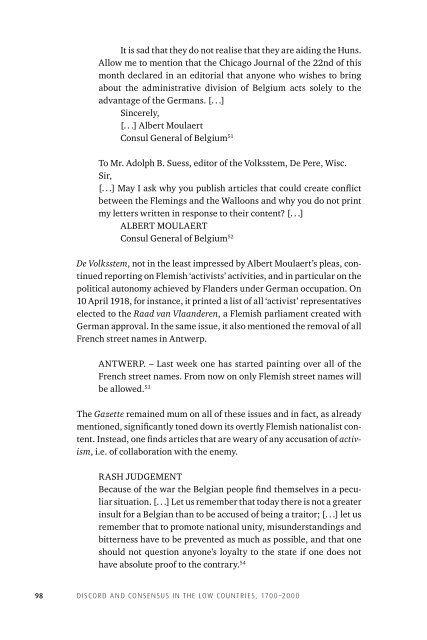Discord Consensus
7aze300jFJo
7aze300jFJo
Create successful ePaper yourself
Turn your PDF publications into a flip-book with our unique Google optimized e-Paper software.
It is sad that they do not realise that they are aiding the Huns.<br />
Allow me to mention that the Chicago Journal of the 22nd of this<br />
month declared in an editorial that anyone who wishes to bring<br />
about the administrative division of Belgium acts solely to the<br />
advantage of the Germans. [. . .]<br />
Sincerely,<br />
[. . .] Albert Moulaert<br />
Consul General of Belgium 51<br />
To Mr. Adolph B. Suess, editor of the Volksstem, De Pere, Wisc.<br />
Sir,<br />
[. . .] May I ask why you publish articles that could create conflict<br />
between the Flemings and the Walloons and why you do not print<br />
my letters written in response to their content? [. . .]<br />
ALBERT MOULAERT<br />
Consul General of Belgium 52<br />
De Volksstem, not in the least impressed by Albert Moulaert’s pleas, continued<br />
reporting on Flemish ‘activists’ activities, and in particular on the<br />
political autonomy achieved by Flanders under German occupation. On<br />
10 April 1918, for instance, it printed a list of all ‘activist’ representatives<br />
elected to the Raad van Vlaanderen, a Flemish parliament created with<br />
German approval. In the same issue, it also mentioned the removal of all<br />
French street names in Antwerp.<br />
ANTWERP. –Last week one has started painting over all of the<br />
French street names. From now on only Flemish street names will<br />
be allowed. 53<br />
The Gazette remained mum on all of these issues and in fact, as already<br />
mentioned, significantly toned down its overtly Flemish nationalist content.<br />
Instead, one finds articles that are weary of any accusation of activism,<br />
i.e. of collaboration with the enemy.<br />
RASH JUDGEMENT<br />
Because of the war the Belgian people find themselves in a peculiar<br />
situation. [. . .] Let us remember that today there is not a greater<br />
insult for a Belgian than to be accused of being a traitor; [. . .] let us<br />
remember that to promote national unity, misunderstandings and<br />
bitterness have to be prevented as much as possible, and that one<br />
should not question anyone’s loyalty to the state if one does not<br />
have absolute proof to the contrary. 54<br />
98<br />
DISCORD AND CONSENSUS IN THE LOW COUNTRIES, 1700–2000


